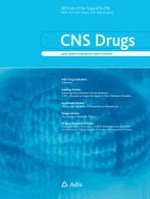01-12-2004 | Leading Article
The Role of Creatine in the Management of Amyotrophic Lateral Sclerosis and Other Neurodegenerative Disorders
Published in: CNS Drugs | Issue 14/2004
Login to get accessAbstract
Creatine is consumed in the diet and endogenously synthesised in the body. Over the past decade, the ergogenic benefits of synthetic creatine monohydrate have made it a popular dietary supplement, particularly among athletes. The anabolic properties of creatine also offer hope for the treatment of diseases characterised by weakness and muscle atrophy. Moreover, because of its cellular mechanisms of action, creatine offers potential benefits for diseases involving mitochondrial dysfunction. Recent data also support the hypothesis that creatine may have a neuroprotective effect.
Amyotrophic lateral sclerosis (ALS) is characterised by progressive degeneration of motor neurons, resulting in weakening and atrophy of skeletal muscles. In patients with this condition, creatine offers potential benefits in terms of facilitating residual muscle contractility as well as improving neuronal function. It may also help stabilise mitochondrial dysfunction, which plays a key role in the pathogenesis of ALS. Indeed, the likely multifactorial aetiology of ALS means the combined pharmacodynamic properties of creatine offer promise for the treatment of this condition.
Evidence from available animal models of ALS supports the utility of treatment with creatine in this setting. Limited data available in other neuromuscular and neurodegenerative diseases further support the potential benefit of creatine monohydrate in ALS. However, few randomised, controlled trials have been conducted. To date, two clinical trials of creatine monohydrate in ALS have been completed without demonstration of significant improvements in overall survival or a composite measure of muscle strength. These trials have also posed unanswered questions about the optimal dosage of creatine and its beneficial effects on muscle fatigue, a measure distinct from muscle strength. A large, multicentre, clinical trial is currently underway to further investigate the efficacy of creatine monohydrate in ALS and address these unresolved issues. Evidence to date shows that creatine supplementation has a good safety profile and is well tolerated by ALS patients.
The purpose of this article is to provide a short, balanced review of the literature concerning creatine monohydrate in the treatment of ALS and related neurodegenerative diseases. The pharmacokinetics and rationale for the use of creatine are described along with available evidence from animal models and clinical trials for ALS and related neurodegenerative or neuromuscular diseases.





